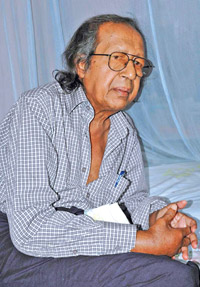Hunter of desires
 Simon
Navagattegama was probably one of the greatest writers of the Sinhala
language. He has been considered as a writer who used most sophisticated
literary traditions in his writings. No one will go against the idea
that he wrote something innovative, but very few will be able to
describe that innovativeness in detail. Simon
Navagattegama was probably one of the greatest writers of the Sinhala
language. He has been considered as a writer who used most sophisticated
literary traditions in his writings. No one will go against the idea
that he wrote something innovative, but very few will be able to
describe that innovativeness in detail.
Navagattegama's works are not easy to analyse in a traditional
literary framework. Many Sri Lankan critics show a fondness in comparing
Nawagattegama with Czech (Bohemian) fiction writer Franc Kafka. Knowing
about Kafka in depth may pave the way to understand who is actually
Simon Navagattegama is. This statement does not imply that Navagattegama
strictly followed Kafka in his writings. They are same in one point: the
point of difference among the fellow writers.
Kafka is ranked among the most important writers of the twentieth
century for works that express modern humanity's loss of personal and
collective order. His writing has inspired the term "Kafkaesque," which
has come to describe situations of psychological, social, political, and
metaphysical instability and confusion that defy logical explanation and
which typify Kafka's conception of humanity's absurd relationship with
the universe.
|

Simon Navagattegama |
The word 'absurd' is often used in literarily criticising
Navagattegama's works. He has been capable of creating the most
attractive absurdity in terms of the concept of 'village'. Kafka is
renowned to his extreme nature in absurdity, but in the case of
Navagattegama, the situation is quite different.
He takes absurdity in quite flexible terms and uses accordingly with
his intentions. For example, he sets his 'Sanasaranyaye Dadayakkaraya'
and 'Sagara Jalaya Madi Handuwa Oba Sanda' in two entirely different
types of villages. While bringing a grave absurdity to the village he
set in 'Sanasaranyaye Dadayakkaraya' he neutralises and brings out the
utmost innocence of the Sri Lankan village in 'Sagara Jalaya Madi
Handuwa Oba Sanda'.
Although Kafka's work has elicited various critical interpretations,
he himself characterized his fiction as symbolic manifestations of his
"dreamlike inner life" in which he attempted to reconcile feelings of
guilt and insecurity. In recent years, some critics have explored
Kafka's relationship with Judaism as demonstrated by his texts. For many
critics, Kafka's greatness resides in his ability to transform his
private torment into universal fables.
Religion plays a crucial role in Nawagattegama's works. Many critics
believe that he has been influenced by tantric or Mahayana philosophies.
He might have read about all of those concepts and he could add flavours
to his writings by elaborating them literarily. But generally he brings
out most simple concepts of Buddhism in his works. Desire and detachment
are key Buddhist concepts that Navagattegama often takes as a base in
his works. He presents desire in 'Sansaranyaye Dadayakkaraya' by using
extensive set of symbols: treasures, the kingly cobra who protects the
treasures and how it was able to get rid of the responsibility of
protecting the treasures.
One of the most acclaimed and influential twentieth-century writers,
Kafka is renowned for prophetic and profoundly enigmatic stories that
often portray human degradation and cruelty. In his works, Kafka
presents a grotesque vision of the world in which alienated,
angst-ridden individuals vainly seek to transcend their condition or
pursue some unattainable goal.
Contrastively, Navagattegama does not set an unattainable goal in his
literary works. A positive and reachable reason can be always seen in
his writings as silver line seen in a dark and cloudy sky. 'Sapekshani'
and 'Kshira Sagaraya Kelambina' are the most positive works done by
Navagattegama.
Navagattegama's fiction derives its power from his use of precise,
dispassionate prose and realistic detail to relate bizarre, often absurd
events, and from his probing treatment of moral and spiritual problems.
Underneath every heavily philosophical attribute, a simple and
natural writer sits in his works.
The shadow of Kafka simply fading out and literarily independent
Simon Navagattegama of Sinhala literature emerges. Naither the 'isms'
nor "Kafkaesque," can describe Navagattegama in best. His unique style
of writing only does. |



